formerly eScholarship Editions


|
|
|
|
Your request for similar items found 20 book(s). | Modify Search | Displaying 1 - 20 of 20 book(s) | |
| 1. | 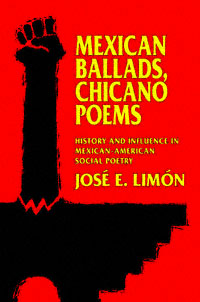 | Title: Mexican ballads, Chicano poems: history and influence in Mexican-American social poetry Author: Limón, José Eduardo Published: University of California Press, 1992 Subjects: Literature | Literary Theory and Criticism | American Literature | American Studies | Latin American History | Folklore and Mythology Publisher's Description: Mexican Ballads, Chicano Poems combines literary theory with the personal engagement of a prominent Chicano scholar. Recalling his experiences as a student in Texas, José Limón examines the politically motivated Chicano poetry of the 60s and 70s. He bases his analyses on Harold Bloom's theories of literary influence but takes Bloom into the socio-political realm. Limón shows how Chicano poetry is nourished by the oral tradition of the Mexican corrido , or master ballad, which was a vital part of artistic and political life along the Mexican-U.S. border from 1890 to 1930.Limón's use of Bloom, as well as of Marxist critics Raymond Williams and Fredric Jameson, brings Chicano literature into the arena of contemporary literary theory. By focusing on an important but little-studied poetic tradition, his book challenges our ideas of the American canon and extends the reach of Hispanists and folklorists as well. [brief] Similar Items |
| 2. | 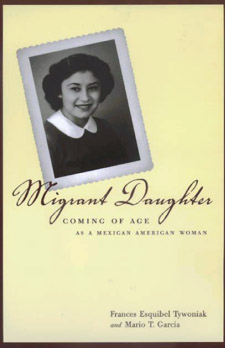 | Title: Migrant daughter: coming of age as a Mexican American woman Author: Tywoniak, Frances Esquibel 1931- Published: University of California Press, 2000 Subjects: Ethnic Studies | Women's Studies | Chicano Studies | California and the West | Californian and Western History | Autobiographies and Biographies Publisher's Description: Taking us from the open spaces of rural New Mexico and the fields of California's Great Central Valley to the intellectual milieu of student life in Berkeley during the 1950s, this memoir, based on an oral history by Mario T. García, is the powerful and moving testimonio of a young Mexican American woman's struggle to rise out of poverty. Migrant Daughter is the coming-of-age story of Frances Esquibel Tywoniak, who was born in Spanish-speaking New Mexico, moved with her family to California during the Depression to attend school and work as a farm laborer, and subsequently won a university scholarship, becoming one of the few Mexican Americans to attend the University of California, Berkeley, at that time. Giving a personal perspective on the conflicts of living in and between cultures, this eloquent story provides a rare glimpse into the life of a young Mexican American woman who achieved her dreams of obtaining a university education. In addition to the many fascinating details of everyday life the narrative provides, Mario T. García's introduction contextualizes the place and importance of Tywoniak's life. Both introduction and narrative illustrate the process by which Tywoniak negotiated her relation to ethnic identity and cultural allegiances, the ways in which she came to find education as a channel for breaking with fieldwork patterns of life, and the effect of migration on family and culture. This deeply personal memoir portrays a courageous Mexican American woman moving between many cultural worlds, a life story that at times parallels, and at times diverges from, the real life experiences of thousands of other, unnamed women. [brief] Similar Items |
| 3. | 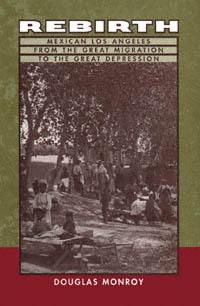 | Title: Rebirth: Mexican Los Angeles from the great migration to the Great Depression Author: Monroy, Douglas Published: University of California Press, 1999 Subjects: History | Latino Studies | United States History | California and the West Publisher's Description: This sweeping, vibrant narrative chronicles the history of the Mexican community in Los Angeles. Douglas Monroy unravels the dramatic, complex story of Mexican immigration to Los Angeles during the early decades of the twentieth century and shows how Mexican immigrants re-created their lives and their communities. Against the backdrop of this newly created cityscape, Rebirth explores pivotal aspects of Mexican Los Angeles during this time - its history, political economy, popular culture - and depicts the creation of a time and place unique in Californian and American history.Mexican boxers, movie stars, politicians, workers, parents, and children, American popular culture and schools, and historical fervor on both sides of the border all come alive in this literary, jargon-free chronicle. In addition to the colorful unfolding of the social and cultural life of Mexican Los Angeles, Monroy tells a story of first-generation immigrants that provides important points of comparison for understanding other immigrant groups in the United States.Monroy shows how the transmigration of space, culture, and reality from Mexico to Los Angeles became neither wholly American nor Mexican, but México de afuera , "Mexico outside," a place where new concerns and new lives emerged from what was both old and familiar. This extremely accessible work uncovers the human stories of a dynamic immigrant population and shows the emergence of a truly transnational history and culture. Rebirth provides an integral piece of Chicano history, as well as an important element of California urban history, with the rich, synthetic portrait it gives of Mexican Los Angeles. [brief] Similar Items |
| 4. | 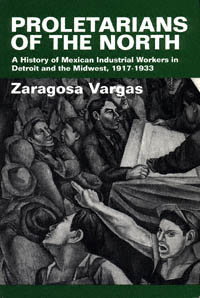 | Title: Proletarians of the North: a history of Mexican industrial workers in Detroit and the Midwest, 1917-1933 Author: Vargas, Zaragosa Published: University of California Press, 1993 Subjects: History | United States History | Latino Studies | Chicano Studies Publisher's Description: Between the end of World War I and the Great Depression, over 58,000 Mexicans journeyed to the Midwest in search of employment. Many found work in agriculture, but thousands more joined the growing ranks of the industrial proletariat. Throughout the northern Midwest, and especially in Detroit, Mexican workers entered steel mills, packing houses, and auto plants, becoming part of the modern American working class.Zaragosa Vargas's work focuses on this little-known feature in the history of Chicanos and American labor. In relating the experiences of Mexicans in workplace and neighborhood, and in showing the roles of Mexican women, the Catholic Church, and labor unions, Vargas enriches our knowledge of immigrant urban life. His is an important work that will be welcomed by historians of Chicano Studies and American labor. [brief] Similar Items |
| 5. | 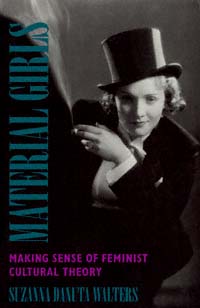 | Title: Material girls: making sense of feminist cultural theory Author: Walters, Suzanna Danuta Published: University of California Press, 1995 Subjects: Gender Studies | Sociology | Women's Studies | American Studies | Politics | Media Studies Publisher's Description: Madonna, Murphy Brown, Thelma and Louise: These much-discussed media icons are the starting points of Suzanna Walter's brilliant, much-needed introduction to feminist cultural theory. Accessible yet theoretically sophisticated, up-to-date and entertaining, Material Girls acquaints readers with the major theories, debates, and concepts in this new and exciting field.With numerous case studies and illustrations, Walters situates feminist cultural theory against the background of the women's movement and media studies. Using examples from film, television, advertising, and popular discourse, she looks at topics such as the "male gaze," narrative theory, and new work on female "ways of seeing" and spectatorship. Throughout, Walters provides a historically grounded account of representations of women in popular culture while critiquing the dominance of psychoanalytic and postmodern analyses.The first comprehensive guide to the approaches and debates that make up this growing field, Material Girls belongs on the shelf of every cultural critic and savvy student today. [brief] Similar Items |
| 6. | 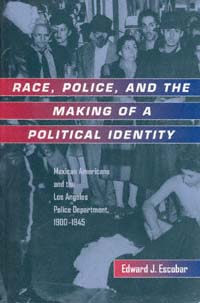 | Title: Race, police, and the making of a political identity: Mexican Americans and the Los Angeles Police Department, 1900-1945 Author: Escobar, Edward J 1946- Published: University of California Press, 1999 Subjects: History | California and the West | Latin American History | Latino Studies | Social Problems | Politics | Californian and Western History | Urban Studies | Criminology | Criminology Publisher's Description: In June 1943, the city of Los Angeles was wrenched apart by the worst rioting it had seen to that point in the twentieth century. Incited by sensational newspaper stories and the growing public hysteria over allegations of widespread Mexican American juvenile crime, scores of American servicemen, joined by civilians and even police officers, roamed the streets of the city in search of young Mexican American men and boys wearing a distinctive style of dress called a Zoot Suit. Once found, the Zoot Suiters were stripped of their clothes, beaten, and left in the street. Over 600 Mexican American youths were arrested. The riots threw a harsh light upon the deteriorating relationship between the Los Angeles Mexican American community and the Los Angeles Police Department in the 1940s.In this study, Edward J. Escobar examines the history of the relationship between the Los Angeles Police Department and the Mexican American community from the turn of the century to the era of the Zoot Suit Riots. Escobar shows the changes in the way police viewed Mexican Americans, increasingly characterizing them as a criminal element, and the corresponding assumption on the part of Mexican Americans that the police were a threat to their community. The broader implications of this relationship are, as Escobar demonstrates, the significance of the role of the police in suppressing labor unrest, the growing connection between ideas about race and criminality, changing public perceptions about Mexican Americans, and the rise of Mexican American political activism. [brief] Similar Items |
| 7. | 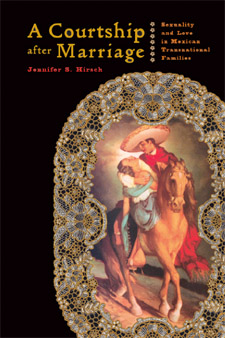 | Title: A courtship after marriage: sexuality and love in Mexican transnational families Author: Hirsch, Jennifer S Published: University of California Press, 2003 Subjects: Anthropology | American Studies | Cultural Anthropology | Latino Studies | Chicano Studies | Sociology | Gender Studies | Latin American Studies | Immigration | Sociology Publisher's Description: From about seven children per woman in 1960, the fertility rate in Mexico has dropped to about 2.6. Such changes are part of a larger transformation explored in this book, a richly detailed ethnographic study of generational and migration-related redefinitions of gender, marriage, and sexuality in r . . . [more] Similar Items |
| 8. | 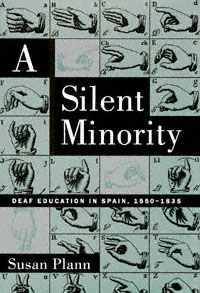 | Title: A silent minority: deaf education in Spain, 1550-1835 Author: Plann, Susan Published: University of California Press, 1997 Subjects: History | Language and Linguistics | Medieval History | European History | Education | European Studies | Medieval Studies | Cultural Anthropology | Cultural Anthropology Publisher's Description: This timely, important, and frequently dramatic story takes place in Spain, for the simple reason that Spain is where language was first systematically taught to the deaf. Instruction is thought to have begun in the mid-sixteenth century in Spanish monastic communities, where the monks under vows of silence employed a well-established system of signed communications. Early in the 1600s, deaf education entered the domain of private tutors, laymen with no use for manual signs who advocated oral instruction for their pupils. Deaf children were taught to speak and lip-read, and this form of deaf education, which has been the subject of controversy ever since, spread from Spain throughout the world.Plann shows how changing conceptions of deafness and language constantly influenced deaf instruction. Nineteenth-century advances brought new opportunities for deaf students, but at the end of what she calls the preprofessional era of deaf education, deaf people were disempowered because they were barred from the teaching profession. The Spanish deaf community to this day shows the effects of the exclusion of deaf teachers for the deaf.The questions raised by Plann's narrative extend well beyond the history of deaf education in Spain: they apply to other minority communities and deaf cultures around the world. At issue are the place of minority communities within the larger society and, ultimately, our tolerance for human diversity and cultural pluralism. [brief] Similar Items |
| 9. | 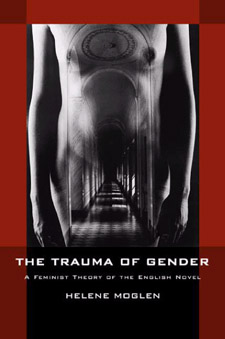 | Title: The trauma of gender: a feminist theory of the English novel Author: Moglen, Helene 1936- Published: University of California Press, 2001 Subjects: Literature | Gender Studies | Women's Studies | European Studies | European History | Literary Theory and Criticism | English Literature Publisher's Description: Helene Moglen offers a revisionary feminist argument about the origins, cultural function, and formal structure of the English novel. While most critics and historians have associated the novel's emergence and development with the burgeoning of capitalism and the rise of the middle classes, Moglen contends that the novel princi- pally came into being in order to manage the social and psychological strains of the modern sex-gender system. Rejecting the familiar claim that realism represents the novel's dominant tradition, she shows that, from its inception in the eighteenth century, the English novel has contained both realistic and fantastic narratives, which compete for primacy within individual texts. [brief] Similar Items |
| 10. | 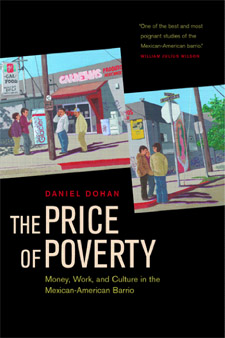 | Title: The price of poverty: money, work, and culture in the Mexican-American barrio Author: Dohan, Daniel 1965- Published: University of California Press, 2003 Subjects: Anthropology | Sociology | Social Problems | Urban Studies | Latin American Studies | Chicano Studies | Labor Studies Publisher's Description: Drawing on two years of ethnographic fieldwork in two impoverished California communities - one made up of recent immigrants from Mexico, the other of U.S.-born Chicano citizens - this book provides an invaluable comparative perspective on Latino poverty in contemporary America. In northern California's high-tech Silicon Valley, author Daniel Dohan shows how recent immigrants get by on low-wage babysitting and dish-cleaning jobs. In the housing projects of Los Angeles, he documents how families and communities of U.S.-born Mexican Americans manage the social and economic dislocations of persistent poverty. Taking readers into worlds where public assistance, street crime, competition for low-wage jobs, and family, pride, and cross-cultural experiences intermingle, The Price of Poverty offers vivid portraits of everyday life in these Mexican American communities while addressing urgent policy questions such as: What accounts for joblessness? How can we make sense of crime in poor communities? Does welfare hurt or help? [brief] Similar Items |
| 11. | 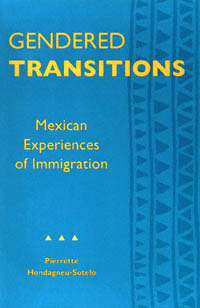 | Title: Gendered transitions: Mexican experiences of immigration Author: Hondagneu-Sotelo, Pierrette Published: University of California Press, 1994 Subjects: Sociology | Latin American Studies | Gender Studies | Chicano Studies | Women's Studies Publisher's Description: The momentous influx of Mexican undocumented workers into the United States over the last decades has spurred new ways of thinking about immigration. Pierrette Hondagneu-Sotelo's incisive book enlarges our understanding of these recently arrived Americans and uncovers the myriad ways that women and men recreate families and community institutions in a new land.Hondagneu-Sotelo argues that people do not migrate as a result of concerted household strategies, but as a consequence of negotiations often fraught with conflict in families and social networks. Migration and settlement transform long-held ideals and lifestyles. Traditional patterns are reevaluated, and new relationships - often more egalitarian - emerge. Women gain greater personal autonomy and independence as they participate in public life and gain access to both social and economic influence previously beyond their reach.Bringing to life the experiences of undocumented immigrants and delineating the key role of women in newly established communities, Gendered Transitions challenges conventional assumptions about gender and migration. It will be essential reading for demographers, historians, sociologists, and policymakers."I've opened my eyes. Back there, they say 'no.' You marry, and no, you must stay home. Here, it's different. You marry, and you continue working. Back in Mexico, it's very different. There is very much machismo in those men." - A Mexican woman living in the United States [brief] Similar Items |
| 12. | 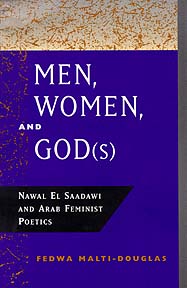 | Title: Men, women, and God(s): Nawal El Saadawi and Arab feminist poetics Author: Malti-Douglas, Fedwa Published: University of California Press, 1995 Subjects: Literature | Middle Eastern Studies | Gender Studies | Women's Studies Publisher's Description: Men, Women, and God(s) is a pioneering study of the Arab world's leading feminist and most controversial woman writer, Nawal El Saadawi. Author of plays, memoirs, and such novels as Woman at Point Zero and The Innocence of the Devil , El Saadawi has become well known in the West as well as in the Arab community for her unforgettable female heroes and explosive narratives, which boldly address sexual violence, female circumcision, theology, and other politically charged themes. Her outspoken feminism and critique of patriarchy have also earned her the wrath of repressive forces in the Middle East. Imprisoned in her native Egypt under Sadat, El Saadawi is now among those on the death lists of Islamic religious conservatives.In Men, Women, and God(s) Fedwa Malti-Douglas makes the work of this important but little-understood writer truly accessible. Contending that El Saadawi's texts cannot be read in isolation from their Islamic and Arabic heritage, Malti-Douglas draws upon a deep knowledge of classical and modern Arabic textual traditions - and on extensive conversations with Nawal El Saadawi - to place the writer within her cultural and historical context. With this impassioned and radical exegesis of El Saadawi's prolific output, Malti-Douglas has written a crucial study of one of the most controversial and influential writers of our time. [brief] Similar Items |
| 13. | 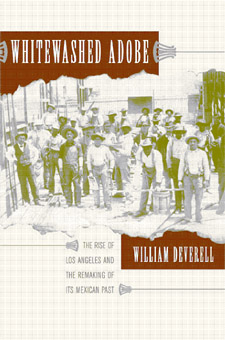 | Title: Whitewashed adobe: the rise of Los Angeles and the remaking of its Mexican past Author: Deverell, William Francis Published: University of California Press, 2004 Subjects: History | Californian and Western History | Chicano Studies | American Studies | Urban Studies Publisher's Description: Chronicling the rise of Los Angeles through shifting ideas of race and ethnicity, William Deverell offers a unique perspective on how the city grew and changed. Whitewashed Adobe considers six different developments in the history of the city - including the cementing of the Los Angeles River, the outbreak of bubonic plague in 1924, and the evolution of America's largest brickyard in the 1920s. In an absorbing narrative supported by a number of previously unpublished period photographs, Deverell shows how a city that was once part of Mexico itself came of age through appropriating - and even obliterating - the region's connections to Mexican places and people. Deverell portrays Los Angeles during the 1850s as a city seething with racial enmity due to the recent war with Mexico. He explains how, within a generation, the city's business interests, looking for a commercially viable way to establish urban identity, borrowed Mexican cultural traditions and put on a carnival called La Fiesta de Los Angeles. He analyzes the subtle ways in which ethnicity came to bear on efforts to corral the unpredictable Los Angeles River and shows how the resident Mexican population was put to work fashioning the modern metropolis. He discusses how Los Angeles responded to the nation's last major outbreak of bubonic plague and concludes by considering the Mission Play, a famed drama tied to regional assumptions about history, progress, and ethnicity. Taking all of these elements into consideration, Whitewashed Adobe uncovers an urban identity - and the power structure that fostered it - with far-reaching implications for contemporary Los Angeles. [brief] Similar Items |
| 14. | 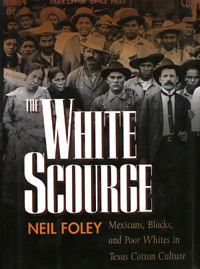 | Title: The white scourge: Mexicans, Blacks, and poor whites in Texas cotton culture Author: Foley, Neil Published: University of California Press, 1998 Subjects: History | Ethnic Studies | American Studies Publisher's Description: In a book that fundamentally challenges our understanding of race in the United States, Neil Foley unravels the complex history of ethnicity in the cotton culture of central Texas. This engrossing narrative, spanning the period from the Civil War through the collapse of tenant farming in the early 1940s, bridges the intellectual chasm between African American and Southern history on one hand and Chicano and Southwestern history on the other. The White Scourge describes a unique borderlands region, where the cultures of the South, West, and Mexico overlap, to provide a deeper understanding of the process of identity formation and to challenge the binary opposition between "black" and "white" that often dominates discussions of American race relations.In Texas, which by 1890 had become the nation's leading cotton-producing state, the presence of Mexican sharecroppers and farm workers complicated the black-white dyad that shaped rural labor relations in the South. With the transformation of agrarian society into corporate agribusiness, white racial identity began to fracture along class lines, further complicating categories of identity. Foley explores the "fringe of whiteness," an ethno-racial borderlands comprising Mexicans, African Americans, and poor whites, to trace shifting ideologies and power relations. By showing how many different ethnic groups are defined in relation to "whiteness," Foley redefines white racial identity as not simply a pinnacle of status but the complex racial, social, and economic matrix in which power and privilege are shared.Foley skillfully weaves archival material with oral history interviews, providing a richly detailed view of everyday life in the Texas cotton culture. Addressing the ways in which historical categories affect the lives of ordinary people, The White Scourge tells the broader story of racial identity in America; at the same time it paints an evocative picture of a unique American region. This truly multiracial narrative touches on many issues central to our understanding of American history: labor and the role of unions, gender roles and their relation to ethnicity, the demise of agrarian whiteness, and the Mexican-American experience. [brief] Similar Items |
| 15. | 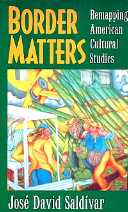 | Title: Border matters: remapping American cultural studies Author: Saldívar, José David Published: University of California Press, 1997 Subjects: Ethnic Studies | Popular Culture | Literature Publisher's Description: Border Matters locates the study of Chicano culture in a broad social context. José Saldívar examines issues of representation and expression in a diverse, exciting assortment of texts - corridos , novels, poems, short stories, punk and hip-hop music, ethnography, paintings, performance, art, and essays. Saldívar provides a sophisticated model for a new kind of U.S. cultural studies, one that challenges the homogeneity of U.S. nationalism and popular culture by foregrounding the contemporary experiences and historical circumstances facing Chicanos and Chicanas.This intellectually adventurous, politically engaged study applies borderlands and diaspora theory to Chicano cultural practices in a way that permanently changes our understanding of both the Chicano experience and the meaning of cultural theory. Defying national (and nationalistic) paradigms of culture, Saldívar argues that the culture of the borderlands is trans-national, constituting a social space in which new relations, hybrid cultures, and multi-voiced aesthetics are negotiated.Saldívar's critical readings treat culture as a social force and reveal the presence of social contexts within cultural texts. Border Matters maps out a new terrain for the study of culture, reshaping the way we understand migration, national identity, and intellectual inquiry itself. [brief] Similar Items |
| 16. | 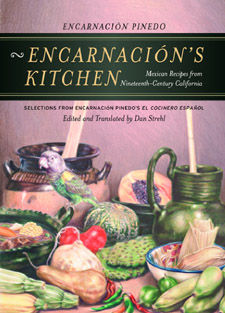 | Title: Encarnación's kitchen: Mexican recipes from nineteenth-century California: selections from Encarnación Pinedo's El cocinero español Author: Pinedo, Encarnación b. 1848 Published: University of California Press, 2003 Subjects: Food and Cooking | California and the West | Californian and Western History | Ethnic Studies | Women's Studies Publisher's Description: In 1991 Ruth Reichl, then a Los Angeles Times food writer, observed that much of the style now identified with California cuisine, and with nouvelle cuisine du Mexique, was practiced by Encarnación Pinedo a century earlier. A landmark of American cuisine first published in 1898 as El cocinero español (The Spanish Cook), Encarnación's Kitchen is the first cookbook written by a Hispanic in the United States, as well as the first recording of Californio food - Mexican cuisine prepared by the Spanish-speaking peoples born in California. Pinedo's cookbook offers a fascinating look into the kitchens of a long-ago culture that continues to exert its influence today. Of some three hundred of Pinedo's recipes included here - a mixture of Basque, Spanish, and Mexican - many are variations on traditional dishes, such as chilaquiles, chiles rellenos, and salsa (for which the cook provides fifteen versions). Whether describing how to prepare cod or ham and eggs (a typical Anglo dish labeled "huevos hipócritas" ), Pinedo was imparting invaluable lessons in culinary history and Latino culture along with her piquant directions. In addition to his lively, clear translation, Dan Strehl offers a remarkable view of Pinedo's family history and of the material and literary culture of early California cooking. Prize-winning journalist Victor Valle puts Pinedo's work into the context of Hispanic women's testimonios of the nineteenth century, explaining how the book is a deliberate act of cultural transmission from a traditionally voiceless group. [brief] Similar Items |
| 17. | 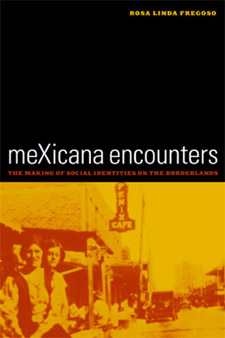 | Title: MeXicana encounters: the making of social identities on the borderlands Author: Fregoso, Rosa Linda Published: University of California Press, 2003 Subjects: Sociology | Chicano Studies | California and the West | Film | Women's Studies | Literary Theory and Criticism | Latin American Studies | American Studies Publisher's Description: meXicana Encounters charts the dynamic and contradictory representation of Mexicanas and Chicanas in culture. Rosa Linda Fregoso's deft analysis of the cultural practices and symbolic forms that shape social identities takes her across a wide and varied terrain. Among the subjects she considers are the recent murders and disappearances of women in Ciudad Juárez; transborder feminist texts that deal with private, domestic forms of violence; how films like John Sayles's Lone Star re-center white masculinity; and the significance of la familia to the identity of Chicanas/os and how it can subordinate gender and sexuality to masculinity and heterosexual roles. Fregoso's self-reflexive approach to cultural politics embraces the movement for social justice and offers new insights into the ways that racial and gender differences are inscribed in cultural practices. [brief] Similar Items |
| 18. | 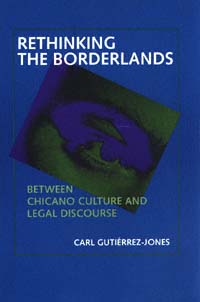 | Title: Rethinking the borderlands: between Chicano culture and legal discourse Author: Gutiérrez-Jones, Carl Scott Published: University of California Press, 1995 Subjects: American Studies | Chicano Studies | Literature | Language and Linguistics | Law | Social and Political Thought | Rhetoric | Postcolonial Studies | United States History | United States History Publisher's Description: Challenging the long-cherished notion of legal objectivity in the United States, Carl Gutiérrez-Jones argues that Chicano history has been consistently shaped by racially biased, combative legal interactions. Rethinking the Borderlands is an insightful and provocative exploration of the ways Chicano and Chicana artists, writers, musicians, and filmmakers engage this history in order to resist the disenfranchising effects of legal institutions, including the prison and the court.Gutiérrez-Jones examines the process by which Chicanos have become associated with criminality in both our legal institutions and our mainstream popular culture and thereby offers a new way of understanding minority social experience. Drawing on gender studies and psychoanalysis, as well as critical legal and race studies, Gutiérrez-Jones's approach to the law and legal discourse reveals the high stakes involved when concepts of social justice are fought out in the home, in the workplace and in the streets. [brief] Similar Items |
| 19. | 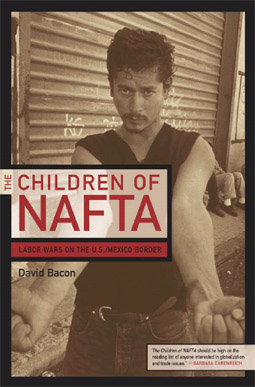 | Title: The children of NAFTA: labor wars on the U.S./Mexico border Author: Bacon, David 1948- Published: University of California Press, 2004 Subjects: Sociology | American Studies | Labor Studies | Ethnic Studies | Latin American Studies | Immigration | Politics | Anthropology Publisher's Description: Food, televisions, computer equipment, plumbing supplies, clothing. Much of the material foundation of our everyday lives is produced along the U.S./Mexico border in a world largely hidden from our view. Based on gripping firsthand accounts, this book investigates the impact of the North American Free Trade Agreement on those who labor in the agricultural fields and maquiladora factories on the border. Journalist David Bacon paints a powerful portrait of poverty, repression, and struggle, offering a devastating critique of NAFTA in the most pointed and in-depth examination of border workers published to date. Unlike journalists who have made brief excursions into strawberry fields and maquiladoras, Bacon has more than a decade's experience reporting on the ground at the border, and he has developed sustained relationships with scores of workers and organizers who have entrusted him with their stories. He describes harsh conditions of child labor in the Mexicali Valley, the deplorable housing outside factories in cities such as Tijuana, and corporate retaliation faced by union organizers. He finds that, despite the promises of its backers, NAFTA has locked in a harsh neoliberal economic policy that has swept away laws and protections that Mexican workers had established over decades. More than a showcase for NAFTA's victims, this book traces the emergence of a new social consciousness, telling how workers in Mexico, the United States, and Canada are now beginning to join together in a powerful new strategy of cross-border organizing as they search for economic and social justice. [brief] Similar Items |
| 20. | 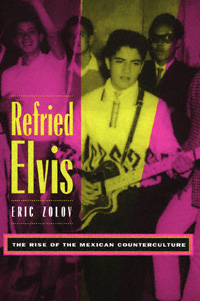 | Title: Refried Elvis: the rise of the Mexican counterculture Author: Zolov, Eric Published: University of California Press, 1999 Subjects: History | Latin American History | Popular Culture | Chicano Studies | Latin American Studies | Contemporary Music Publisher's Description: This powerful study shows how America's biggest export, rock and roll, became a major influence in Mexican politics, society, and culture. From the arrival of Elvis in Mexico during the 1950s to the emergence of a full-blown counterculture movement by the late 1960s, Eric Zolov uses rock and roll to illuminate Mexican history through these charged decades and into the 1970s. This fascinating narrative traces the rechanneling of youth energies away from political protest in the wake of the 1968 student movement and into counterculture rebellion, known as La Onda (The Wave). Refried Elvis accounts for the events of 1968 and their aftermath by revealing a mounting crisis of patriarchal values, linked both to the experience of modernization during the 1950s and 1960s and to the limits of cultural nationalism as promoted by a one-party state.Through an engrossing analysis of music and film, as well as fanzines, newspapers, government documents, company reports, and numerous interviews, Zolov shows how rock music culture became a volatile commodity force, whose production and consumption strategies were shaped by intellectuals, state agencies, transnational and local capital, musicians, and fans alike. More than a history of Mexican rock and roll, Zolov's study demonstrates the politicized nature of culture under authoritarianism, and offers a nuanced discussion of the effects of cultural imperialism that deepens our understanding of gender relations, social hierarchies, and the very meanings of national identity in a transnational era. [brief] Similar Items |